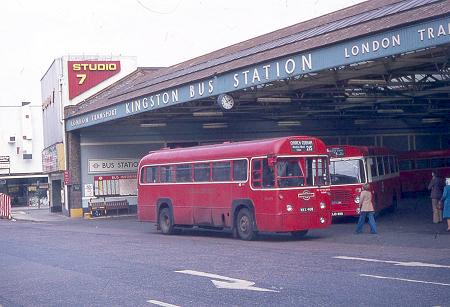RF425 is operating from
Sutton garage in this view, but not on the
151 (the clue is the running number - the 151 was
a single-bus route). On the last day of RF operation on
routes
80 and
80A, 26 June 1976, a co-operative
driver changed the blinds at Belmont Station for the photo.
The 151 had ceased five years previously.
After the war, London Transport’s fleet needed major
renewal. First to be dealt with were the double-deckers,
involving the production of nearly 7,000 of the
RT family. Once these were nearing
completion, LT turned its attention to the single-deck fleet.
Using ideas from the pre-war Q and underfloor-engined TF classes,
the RF used a similar 9.6 litre AEC diesel engine to the RT, but
laid on its side under the floor. The first of 700 was
delivered in 1951.
Following the introduction of RFs on Green Line services,
the 225 red RFs were delivered in 1952 and
1953. Initially, the red buses had no doors (or
heaters), the absence of doors being a requirement of the
Metropolitan Police as it was supposed they would slow down
boarding and delay the traffic. Doors were fitted
progressively to the fleet as buses were converted for one-man
operation, with the last doorless buses, the last running with
conductors, on route
236 in 1971.

At 30 feet, the red buses were built to the then
maximum permitted length and originally carried 41 passengers,
this being reduced to 39 by the addition of a luggage rack
when converted for one-man operation. Other changes over
the years included the fitting of indicator 'ears' in
1956 and the fitting of heaters.
The conversions enabled the introduction of large-bus OMO in
the Central Area - on four routes in 1964, 15 years after the
last OMO 20-seat Cubs ran on the 238 and 252. While the
Merlins and Swifts came and went, RFs continued to run reliably
through the 1970s, until finally replaced by BL-class Bristol LHs
and Leyland Nationals. The last few finished on Kingston's
jointly-worked routes 218 and 219 on 30 March 1979.